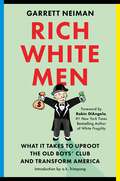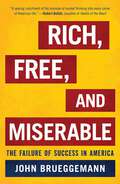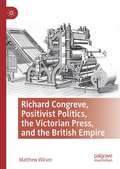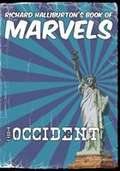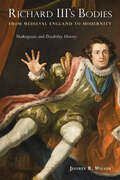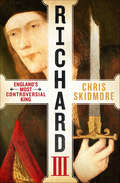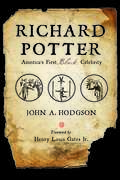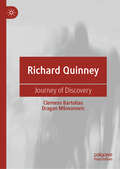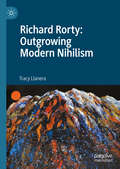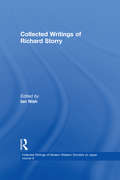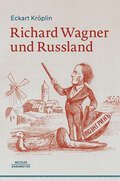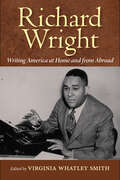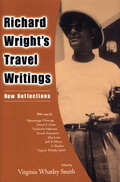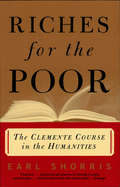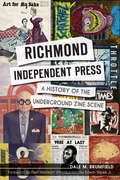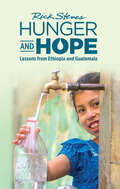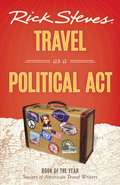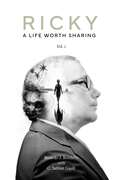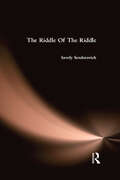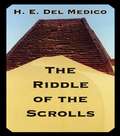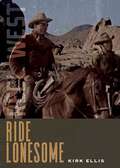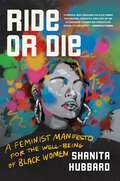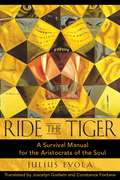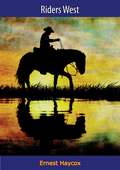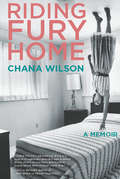- Table View
- List View
Rich White Men: What It Takes to Uproot the Old Boys' Club and Transform America
by Garrett NeimanWith a foreword by New York Times bestselling author Robin DiAngelo, this provocative book investigates major corporate boardrooms and presents a data-driven analysis of how rich white men have preserved their monopoly on power—and what we can do to stop them. It&’s no secret that our country has a serious problem when it comes to wealth inequality – and systemic racism and patriarchy have only exacerbated the advantages of wealthy white men. Over the past three decades, America&’s richest white men have only become richer, while those suffering in poverty have only gotten poorer. The divide may seem too great to bridge, but Rich White Men exposes the hidden and insidious ways that white male elites inherit, increase, and preserve their status—and, in this book, we get clear on how to uproot their monopoly on power. Serial nonprofit entrepreneur Garrett Neiman&’s day job is to get rich white men to donate money to good causes and organizations. In Rich White Men, Neiman brings us into corner offices of billionaires and the boardrooms of Goldman Sachs, McKinsey, Stanford, Harvard, and other enclaves of silver-spooned white men to illuminate the role of rich white men in the world and how they justify inequality. He uses the analogy of compound interest to illustrate how the advantages wealthy white men inherit give them a leg up at key moments in their lives, gilding their trajectories and shutting others out. Through this rare, insider access, readers will discover new ways to persuade the elite toward progressive solutions. A hopeful polemic, the book sheds light on dark truths about inequality and the people invested in preserving it while also providing a blueprint for how America can become an equitable democracy.Rich White Men reveals that to realize America&’s founding aspiration of life, liberty, and the pursuit of happiness, we must recognize, dismantle, and transform our current system into one that liberates us all – including this nation&’s morally and spiritually impoverished wealthy white men.
Rich, Free, and Miserable: The Failure of Success in America
by John BrueggemannCompared to much of the rest of the world, America and its citizens are rich. But many people are also deeply miserable—at work, at home, or both. In this provocative book, author John Brueggemann unpacks why so many people are struggling, both emotionally and financially, in a nation that looks so prosperous on the surface. From a hospital patient reduced to a balance sheet to a parent working such long hours that he misses dinner, Brueggemann argues that market thinking has permeated every corner of our lives. In the pursuit of more and better, relationships erode, to the detriment of individuals, communities, and the nation as a whole. Rich, Free, and Miserable not only outlines these pressing social problems, but also offers practical suggestions for people looking to make a positive change.
Richard Congreve, Positivist Politics, the Victorian Press, and the British Empire
by Matthew WilsonThis book is about the life and times of Richard Congreve. This polemicist was the first thinker to gain instant infamy for publishing cogent critiques of imperialism in Victorian Britain. As the foremost British acolyte of Auguste Comte, Congreve sought to employ the philosopher’s new science of sociology to dismantle the British Empire. With an aim to realise in its place Comte’s global vision of utopian socialist republican city-states, the former Oxford don and ex-Anglican minister launched his Church of Humanity in 1859. Over the next forty years, Congreve engaged in some of the most pressing foreign and domestic controversies of his day, despite facing fierce personal attacks in the Victorian press. Congreve made overlooked contributions to the history of science, political economy, and secular ethics. In this book Matthew Wilson argues that Congreve’s polemics, ‘in the name of Humanity’, served as the devotional practices of his Positivist church.
Richard Halliburton's Book Of Marvels: The Occident
by Richard HalliburtonWritten for students but loved by all ages Marvels of the Occident takes you on a journey to some of the marvels of our world. Visit wonders both natural and man-made, places you've heard about, and others you won't believe you didn't know of before.
Richard III's Bodies from Medieval England to Modernity: Shakespeare and Disability History
by Jeffrey R. WilsonRichard III will always be central to English disability history as both man and myth—a disabled medieval king made into a monster by his nation’s most important artist. In Richard III’s Bodies from Medieval England to Modernity, Jeffrey Wilson tracks disability over 500 years, from Richard’s own manuscripts, early Tudor propaganda, and x-rays of sixteenth-century paintings through Shakespeare’s soliloquies, into Samuel Johnson’s editorial notes, the first play produced by an African American Theater company, Freudian psychoanalysis, and the rise of disability theater. For Wilson, the changing meanings of disability created through shifting perspectives in Shakespeare’s plays prefigure a series of modern attempts to understand Richard’s body in different disciplinary contexts—from history and philosophy to sociology and medicine. While theorizing a role for Shakespeare in the field of disability history, Wilson reveals how Richard III has become an index for some of modernity’s central concerns—the tension between appearance and reality, the conflict between individual will and external forces of nature and culture, the possibility of upward social mobility, and social interaction between self and other, including questions of discrimination, prejudice, hatred, oppression, power, and justice.
Richard III: England's Most Controversial King
by Chris Skidmore“A bold and fresh new biography of one of the most enduringly fascinating monarchs . . . steeped in the latest research and majestically narrated.” —Dan Jones, award-winning historian and New York Times–bestselling author of The PlantagenetsFrom acclaimed historian Chris Skidmore comes the authoritative biography of Richard III, England’s most controversial king, a man alternately praised as a saint and cursed as a villain.Richard III is one of English history’s best known and least understood monarchs. Immortalized by Shakespeare as a hunchbacked murderer, the discovery in 2012 of his skeleton in a Leicester parking lot re-ignited debate over the true character of England’s most controversial king.Richard was born into an age of brutality, when civil war gripped the land and the Yorkist dynasty clung to the crown with their fingertips. Was he really a power-crazed monster who killed his nephews, or the victim of the first political smear campaign conducted by the Tudors?In the first full biography of Richard III for fifty years, Chris Skidmore draws on new manuscript evidence to reassess Richard’s life and times.Richard III examines in intense detail Richard’s inner nature and his complex relations with those around him to unravel the mystery of the last English monarch to die on the battlefield.“This highly readable chronicle comprises vaulting ambition, familial betrayal, moral corruption, high politics, foul murder and a beautiful queen lusting for revenge.” —Wall Street Journal“[Skidmore's] biography bids fair to become the definitive account for the 21st century.” —Washington Independent Review of Books“A gripping, vivid, fresh portrait of Richard III.” —Simon Sebag Montefiore“A portrait that chills you to the bone.” —The Times of London
Richard Potter: America's First Black Celebrity
by John A. HodgsonApart from a handful of exotic--and almost completely unreliable--tales surrounding his life, Richard Potter is almost unknown today. Two hundred years ago, however, he was the most popular entertainer in America--the first showman, in fact, to win truly nationwide fame. Working as a magician and ventriloquist, he personified for an entire generation what a popular performer was and made an invaluable contribution to establishing popular entertainment as a major part of American life. His story is all the more remarkable in that Richard Potter was also a black man. This was an era when few African Americans became highly successful, much less famous. As the son of a slave, Potter was fortunate to have opportunities at all. At home in Boston, he was widely recognized as black, but elsewhere in America audiences entertained themselves with romantic speculations about his "Hindu" ancestry (a perception encouraged by his act and costumes). Richard Potter’s performances were enjoyed by an enormous public, but his life off stage has always remained hidden and unknown. Now, for the first time, John A. Hodgson tells the remarkable, compelling--and ultimately heartbreaking--story of Potter’s life, a tale of professional success and celebrity counterbalanced by racial vulnerability in an increasingly hostile world. It is a story of race relations, too, and of remarkable, highly influential black gentlemanliness and respectability: as the unsung precursor of Frederick Douglass, Richard Potter demonstrated to an entire generation of Americans that a black man, no less than a white man, could exemplify the best qualities of humanity. The apparently trivial "popular entertainment" status of his work has long blinded historians to his significance and even to his presence. Now at last we can recognize him as a seminal figure in American history.
Richard Quinney: Journey of Discovery (Palgrave Pioneers in Criminology)
by Clemens Bartollas Dragan MilovanovicThis book traces the life course of Richard Quinney, one of the most cited authors in the social sciences and a key figure in the development of critical criminology in the 70s, 80s and 90s. It provides a look into his personal thoughts in becoming a 'radical' criminologist and situates it in his various experiences, questioning, and shifts in his journey through life. Richard has contributed to a profound paradigm shift in criminology, beginning with his book, The Social Reality of Crime (1970), but also to peacemaking criminology as well as peace studies. He has also written several books via an autoethnography approach and has presented a number of photograph presentations for which he has received awards. It traces his early development on the family farm in Wisconsin to his travels in higher academe. It gives a personal perspective in becoming not only a radical criminologist, an accomplished writer in auto-ethnography, visual sociology, and photography but also how his continuous questioning of the meaning of it all came to fruition with profound insights about what it is to be human. The book will be inspirational to not only seasoned veterans in criminology, but also to emerging scholars, to undergrads and grads, showing them the struggles that come in 'making it'.
Richard Rorty: Outgrowing Modern Nihilism
by Tracy LlaneraThe book makes a new contribution to the contemporary debates on nihilism and the sacred. Drawing on an original interpretation of Richard Rorty’s writings, it challenges the orthodox treatment of nihilism as a malaise that human beings must overcome. Instead, nihilism should be framed as a problem for human culture to outgrow through pragmatism.
Richard Storry - Collected Writings (Collected Writings of Modern Western Scholars on Japan #Vol. 9)
by Richard StorryThis volume of the Collected Writings of Modern Western Scholars on Japan series, published under the Japan Library imprint, collects the work of Richard Storry on contempory issues and the history of Japan.
Richard Wagner und Russland
by Eckart KröplinWagner und Russland? Dieser Fragestellung, die in der deutschsprachigen Wagnerliteratur bislang als peripher angesehen wurde, geht Eckart Kröplin in seiner ausführlichen Kulturgeschichte nach, die auch so manche überraschende, bislang nicht bekannte Tatsachen vorstellt. Er beschreibt wesentliche biografische Momente wie Wagners Kapellmeistertätigkeit in Riga, sein Verhältnis zum russischen Revolutionär Bakunin, seine große Konzertreise 1863 nach Petersburg und Moskau, das Verhältnis russischer Musiker und Dichter zu dem deutschen Komponisten und dessen revolutionären ästhetischen Ideen und weiterhin auch die zeitweilige Dominanz Wagnerscher Opern im Repertoire der Opernhäuser und Konzertsäle des Landes oder seine herausragende Bedeutung für die Künstlerkreise des russischen Symbolismus und schließlich seine widerspruchsvolle Rezeption nach der Oktoberrevolution und unter der Stalinherrschaft. In Wagners Verhältnis zu Russland bzw. Russlands Verhältnis zu Wagner spiegelt sich ein facettenreiches Spannungsfeld europäischer Kulturgeschichte.
Richard Wright Writing America at Home and from Abroad: New Reflections
by Virginia Whatley SmithContributions by Robert J. Butler, Ginevra Geraci, Yoshinobu Hakutani, Floyd W. Hayes III, Joseph Keith, Toru Kiuchi, John Lowe, Sachi Nakachi, Virginia Whatley Smith, and John Zheng Critics in this volume reassess the prescient nature of Richard Wright's mind as well as his life and body of writings, especially those directly concerned with America and its racial dynamics. This edited collection offers new readings and understandings of the particular America that became Wright's focus at the beginning of his career and was still prominent in his mind at the end. Virginia Whatley Smith's edited collection examines Wright's fixation with America at home and from abroad: his oppression by, rejection of, conflict with, revolts against, and flight from America. Other people have written on Wright's revolutionary heroes, his difficulties with the FBI, and his works as a postcolonial provocateur; but none have focused singly on his treatment of America. Wherever Wright traveled, he always positioned himself as an African American as he compared his experiences to those at hand. However, as his domestic settlements changed to international residences, Wright's craftsmanship changed as well. To convey his cultural message, Wright created characters, themes, and plots that would expose arbitrary and whimsical American policies, oppressive rules which would invariably ensnare Wright's protagonists and sink them more deeply into the quagmire of racial subjugation as they grasped for a fleeting moment of freedom. Smith's collection brings to the fore new ways of looking at Wright, particularly his post-Native Son international writings. Indeed, no critical interrogations have considered the full significance of Wright's masterful crime fictions. In addition, the author's haiku poetry complements the fictional pieces addressed here, reflecting Wright's attitude toward America as he, near the end of his life, searched for nirvana—his antidote to American racism.
Richard Wright's Travel Writings: New Reflections
by Virginia Whatley SmithAttracted to remote lands by his interest in the postcolonial struggle, Richard Wright (1908-1960) became one of the few African Americans of his time to engage in travel writing. He went to emerging nations not as a sightseer but as a student of their cultures, learning the politics and the processes of social transformation. When Wright fled from the United States in 1946 to live as an expatriate in Paris, he was exposed to intellectual thoughts and challenges that transcended his social and political education in America. Three events broadened his world view—his introduction to French existentialism, the rise of the Pan-Africanist movement to decolonize Africa, and Indonesia's declaration of independence from colonial rule in 1945. During the 1950s as he traveled to emerging nations, his encounters produced four travel narratives—Black Power (1953), The Color Curtain (1956), Pagan Spain (1956), and White Man, Listen! (1957). Upon his death in 1960, he left behind an unfinished book on French West Africa, which exists only in notes, outlines, and a draft. Written by multinational scholars, this collection of essays exploring Wright's travel writings shows how in his hands the genre of travel writing resisted, adapted, or modified the forms and formats practiced by white authors. Enhanced by nine photographs taken by Wright during his travels, the essays focus on each of Wright's four separate narratives as well as upon his unfinished book and reveal how Wright drew on such non-Western influences as the African American slave narrative and Asian literature of protest and resistance. The essays critique Wright's representation of customs and people and employ a broad range of interpretive modes, including the theories of formalism, feminism, and postmodernism, among others. Wright's travel books are proven to be innovative narratives that laid down the roots of such later genres as postcolonial literature, contemporary travel writing, and resistance literature.
Riches for the Poor: The Clemente Course in the Humanities
by Earl Shorris"You've been cheated," Earl Shorris tells a classroom of poor people in New York City. "Rich people learn the humanities; you didn't. . . . It is generally accepted in America that the liberal arts and humanities in particular belong to the elite. I think you're the elite." In this groundbreaking work, Shorris examines the nature of poverty in America today. Why are people poor, and why do they stay poor? Shorris argues that they lack politics, or the ability to participate fully in the public world; knowing only the immediacy and oppression of force, the poor remain trapped and isolated. To test his theory, Shorris creates an experimental school teaching the humanities to poor people, giving them the means to reflect and negotiate rather than react. The results are nothing short of astonishing. Originally published in hardcover under the title New American Blues.
Richmond Independent Press: A History of the Underground Zine Scene
by Dale M BrumfieldAn acclaimed local author recounts the evolution of Richmond&’s alternative newspapers, comics, and small presses beginning in the Civil Rights Era. As the political and social upheaval of the 1960s took hold across the United States, even the sleepy town of Richmond, Virginia, experienced a countercultural shift. New attitudes about the value of journalism spurred an underground movement in the press. &“The Sunflower,&” Richmond&’s first underground newspaper, appeared in 1967 and set the stage for a host of alternative local media lasting into the 1990s and beyond. Publications such as the &“Richmond Chronicle,&” &“Richmond Mercury,&” and &“Commonwealth Times,&” as well as numerous minority-focused presses such as &“Richmond Afro-American,&” served the progressive-minded citizens of the River City. In Richmond Independent Press, the historian, activist and former &“ThroTTle&” editor Dale Brumfield reveals the untold story of this cultural revolution in the River City.</
Rick Steves Hunger and Hope
by Rick StevesIn his one-hour public television special, Rick Steves' Hunger and Hope, travel expert Rick Steves ventures beyond Europe to learn about the key realities of extreme poverty. Inside this companion e-book, you'll uncover Rick's firsthand insights on:How ending world hunger in our lifetime is an attainable goal The importance of water access, education, women's empowerment, and financial literacy in creating long-term independence How communities are using smart development to rise out of povertyJoin Rick Steves in Ethiopia and Guatemala and discover how you can make a difference.
Rick Steves Travel as a Political Act
by Rick StevesTravel connects people with people. It helps us fit more comfortably and compatibly into a shrinking world, and it inspires creative new solutions to persistent problems facing our nation. We can't understand our world without experiencing it. Rick Steves Travel as a Political Act helps us take that first step.There's more to travel than good-value hotels, great art, and tasty cuisine. Americans who "travel as a political act" can have the time of their lives and come home smarter-with a better understanding of the interconnectedness of today's world and just how our nation fits in.In the second edition of this award-winning book, acclaimed travel writer Rick Steves explains how to travel more thoughtfully-to any destination. With updated information on Europe, Central America, and Asia; an expanded discussion of the Middle East; and a brand-new chapter on the Holy Land that covers Israelis and Palestinians today, Rick shows readers how his travels have shaped his politics and broadened his perspective.The royalties from the sale of this edition will be donated by Rick Steves to Bread for the World, a Christian organization working to end hunger around the world.
Ricky: A Life Worth Sharing, Volume I
by Ricardo J. Bordallo C. Sablan GaultBefore he was a businessman, senator, and governor, Ricardo J. Bordallo was simply “Ricky,” a young CHamoru man from Guam, the island he loved. The first volume of a two-part series, Ricky: A Life Worth Sharing is Bordallo’s account of his early life, as told to his cousin C. Sablan Gault. From an idyllic village childhood to the horrors of the occupation during WWII and the shifting cultural and political landscape of an island transformed in the aftermath of war, Ricky explores the formative experiences of one of Guam’s most well-known public figures.
Riddle Of The Riddle
by SenderovichFirst Published in 2005. Routledge is an imprint of Taylor & Francis, an informa company.
Riddle Of The Scrolls
by DelFirst published in 2007. Routledge is an imprint of Taylor & Francis, an informa company.
Ride Lonesome (Reel West Series)
by Kirk EllisRide Lonesome, the fifth film in the &“Ranown cycle,&” is both the best and most representative of the whole cycle, which has been called &“the most remarkable convergence of artistic achievement in the history of low-budget moviemaking.&” Director Bud Boetticher captures the alienation and loneliness of an America faced with the Cold War and the daily threat of nuclear annihilation. Shot in seventeen days for under a half-million dollars, Ride Lonesome is a masterpiece of cinematic minimalism.Veteran screenwriter Kirk Ellis brilliantly unpacks the themes, narrative, visual language, and editing in this seminal film. In Ride Lonesome he not only shows how this one film embodies a turning point for the Western, but he also explores the unique vision and contributions of director Boetticher and his writing partner Burt Kennedy.
Ride or Die: A Feminist Manifesto for the Well-Being of Black Women
by Shanita HubbardCultural criticism and pop culture history intertwine in this important book, which dissects how hip hop has sidelined Black women's identity and emotional well-being. A &“ride-or-die chick&” is a woman who holds down her family and community. She&’s your girl that you can call up in the middle of the night to bail you out of jail, and you know she&’ll show up and won&’t ask any questions. Her ride-or-die trope becomes a problem when she does it indiscriminately. She does anything for her family, friends, and significant other, even at the cost of her own well-being. &“No&” is not in her vocabulary. Her self-worth is connected to how much labor she can provide for others. She goes above and beyond for everyone in every aspect of her life—work, family, church, even if it&’s not reciprocated, and doesn&’t require it to be because she&’s a &“strong Black woman&” and everyone&’s favorite ride-or-die chick. To her, love should be earned, and there&’s no limit to what she&’ll do for it. In this book, author, adjunct professor of sociology, and former therapist Shanita Hubbard disrupts the ride-or-die complex and argues that this way of life has left Black women exhausted, overworked, overlooked, and feeling depleted. She suggests that Black women are susceptible to this mentality because it&’s normalized in our culture. It rings loud in your favorite hip-hop songs, and it even shows up in the most important relationship you will ever have—the one with yourself. Compassionate, candid, hard-hitting, and 100 percent unapologetic, Ride or Die melds Hubbard&’s entertaining conversations with her Black girlfriends and her personal experiences as a redeemed ride-or-die chick and a former &“captain of the build-a-brother team&” to fervently dismantle cultural norms that require Black women to take care of everyone but themselves. Ride or Die urges you to expel the myth that your self-worth is connected to how much labor you provide others and guides you toward healing. Using hip hop as a backdrop to explore norms that are harmful to Black women, Hubbard shows the ways you may be unknowingly perpetuating this harm within your relationships. This book is an urgent call for you to pull the plug on the ride-or-die chick.
Ride the Tiger: A Survival Manual for the Aristocrats of the Soul
by Joscelyn Godwin Julius Evola Constance FontanaJulius Evola’s final major work, which examines the prototype of the human being who can give absolute meaning to his or her life in a world of dissolution• Presents a powerful criticism of the idols, structures, theories, and illusions of our modern age• Reveals how to transform destructive processes into inner liberationThe organizations and institutions that, in a traditional civilization and society, would have allowed an individual to realize himself completely, to defend the principal values he recognizes as his own, and to structure his life in a clear and unambiguous way, no longer exist in the contemporary world. Everything that has come to predominate in the modern world is the direct antithesis of the world of Tradition, in which a society is ruled by principles that transcend the merely human and transitory.Ride the Tiger presents an implacable criticism of the idols, structures, theories, and illusions of our dissolute age examined in the light of the inner teachings of indestructible Tradition. Evola identifies the type of human capable of “riding the tiger,” who may transform destructive processes into inner liberation. He offers hope for those who wish to reembrace Traditionalism.
Riders West
by Ernest HaycoxA MAN ON THE PROD—A RANGE AT WARNeel St. Could, forced by his vendetta with Dan Bellew, had a plan to turn the peaceful valley into an outlaw strip ruled by flaming guns.First he put his own crooked sheriff into office. Then he imported an army of gunslicks, took over Trail City and burned out the nesters. With the remaining spreads isolated, St. Cloud made his move.And on a storm-lashed night a hundred guns fought it out—with St. Cloud and Dan Bellew clashing head-on in their own personal battle.“Fast and Breathless”—New York Times
Riding Fury Home: A Memoir
by Chana WilsonIn 1958, when Chana Wilson was seven, her mother held a rifle to her head and pulled the trigger. The gun jammed and she was taken away to a mental hospital. On her return, Chana became the caretaker of her heavily medicated, suicidal mother. It would be many years before she learned the secret of her mother’s anguish: her love affair with another married woman, and the psychiatric treatment aimed at curing her of her lesbianism. Riding Fury Homespans forty years of the intense, complex relationship between Chana and her mother-the trauma of their early years together, the transformation and joy they found when they both came out in the 1970s, and the deep bond that grew between them. From the intolerance of the '50s to the exhilaration of the women’s movement of the '70s and beyond, the book traces the profound ways in which their two lives were impacted by the social landscape of their time. Exquisitely written and devastatingly honest,Riding Fury Homeis a shattering account of one family’s struggle against homophobia and mental illness-and a powerful story of healing, forgiveness, and redemption.
